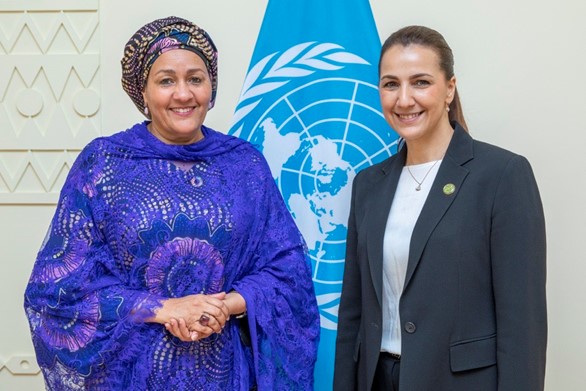SEED FUNDING JOINT PROGRAMMES
Egypt
Strengthening Sustainable and Resilient Food and Nutrition Systems in Egypt for SDG Acceleration




PROJECT TITLE | Strengthening Sustainable and Resilient Food and Nutrition Systems in Egypt for SDG Acceleration |
| Context | Egypt engaged actively in the 2021 Food Systems Summit process, convening a national dialogue and developing national pathways with recommended interventions for improving food security and nutrition by 2030. To enhance multi-sectorial coordination and spearhead the transformation process, the Government created a National Committee for Food and Nutrition Systems chaired by the Prime Minister and bringing together several ministries to coordinate joint actions. Strengthening coordination mechanisms, fostering multi-stakeholder partnerships, consolidating accountability structures, focusing on the availability of evidence, analysis, and data, are identified as key priorities to strengthen the food systems governance structure in Egypt. |
| PUNOs | WFP, FAO, UNICEF |
| Contribution to SDGs | SDG 2 Zero Hunger, SDG 3 Good Health and Well-being, 12 Responsible Consumption and Production. |
| Contribution to other SDG transitions | Climate, biodiversity, pollution |
| Duration | June 2024 – May 2025 |
| Expected financial leverage | $87,000 (PUNO co-financing) |
| Alignment with SG Call to Action | Policy integration; Food systems governance; Research, data, technology and innovation; Inclusive and participatory design; Private sector engagement |
| Outcomes | The JP contributes to strengthening policy and governance frameworks for food systems transformation and generating evidence and analysis on key dimensions of food systems to inform decision-making, supporting the work of the National Committee for Food and Nutrition Systems. The JP complements the government’s flagship program “Country Platform for the Nexus of Water, Food and Energy”, which provides a mechanism to mobilize climate finance and private investments. |
| Partners |
|
| Outputs |
|
PRESS RELEASE - COP28 Presidency and UN Food Systems Coordination Hub Join Forces to Harness the Power of Food Systems Transformation for Climate Action
A new strategic partnership will elevate the role of food systems as one of the most impactful accelerators of the SDGs and a critical area for Climate Action.

Pictured: UN Deputy Secretary-General, Ms Amina Mohammed and H.E. Mariam Almheiri, UAE Minister for Climate Change and Environment and COP28 Food Systems Lead, at the UN Food Systems Summit +2 Stocktaking Moment, 25 July.
©FAO
Rome and Abu Dhabi, 26 July 2023 –The COP28 Presidency and the United Nations Food Systems Coordination Hub (The Hub), are pleased to announce a new strategic partnership, aimed at elevating the role of food systems as a catalyst for achieving the SDGs and the targets for the Paris Agreement.
The goal of the partnership is to convene mutually supportive processes with respect to food systems transformation and climate action, in the broader landscape of global events and milestones related to sustainable development, including the SDGS Summit, the 2024 UN Summit of the Future, the 1st and 2nd UN Food Systems Stocktaking Moments in 2023 and 2025, and the COPs from 2023 to 2025.
Speaking on the announcement, H.E. Mariam Almheiri, UAE Minister for Climate Change and Environment and COP28 Food Systems Lead, said, “As we navigate the complex challenges of the 21st century, it is increasingly evident that sustainable and resilient food systems are pivotal to achieving a more prosperous and equitable world. By leveraging the UAE's leadership as the host of COP28 and the UN Food Systems Coordination Hub's expertise, this strategic partnership aims to foster collaboration, innovation, and transformative action across food systems, setting us on a path towards a sustainable future for all.”
The COP28 Food Systems and Agriculture Agenda, launched in Rome this week, prioritizes key food systems objectives, including aligning national food systems and agricultural policies and planning processes with Nationally Determined Contributions (NDCs) and National Adaptation Plan (NAP) by 2025. The UN Food Systems Coordination Hub will contribute to the several tracks of the Action Agenda and will support the Presidency on engagement with State and Non-State Actors. Based on concrete examples and inputs from central players, the partnership will be looking for gathering and upscaling solutions and actionable recommendations for supporting policies and action as scale that will simultaneously produce food systems and climate gains.
“Building upon the outcomes of the UN Food Systems Summit+2, it presents a unique opportunity to mobilize global leaders, policymakers and stakeholders to translate global commitments for climate action and food systems transformation into tangible actions for the SDGs,” said the UN Deputy Secretary-General, Ms. Amina Mohammed.
A central aspect of this strategic partnership is to secure the commitment of Heads of State and governments attending COP28 to implement these actions by facilitating the signing of the first-ever Leaders Declaration on Food Systems, Agriculture, and Climate Action. This declaration will serve as a landmark commitment, consolidating global ambition and firmly establishing food systems as a prominent item on the climate agenda and within the COP process for years to come.
Contact
For media inquiries, please contact:
COP28 UAE
UN Food Systems Coordination Hub
